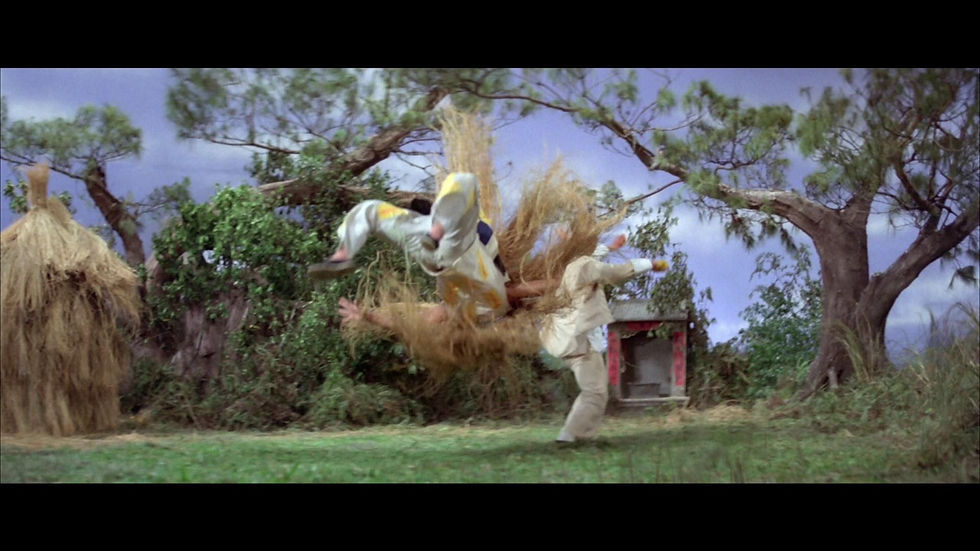The Shadow Boxing Blu-ray Review
- Gabe Powers
- Sep 23, 2024
- 4 min read

88 Films
Blu-ray Release: September 24, 2024
Video: 2.35:1/1080p/Color
Audio: Mandarin LPCM 2.0 Mono
Subtitles: English
Run Time: 101:00
Director: Lau Kar-leung
An apprentice undertaker (Wong Yeu) and his drunken master (Lau Kar-win) embark on a routine journey, utilizing Taoist charms and techniques to transport the bodies of the dead. Along the way, they run into trouble with the authorities and unscrupulous gamblers, a strong-willed young woman (Cecelia Wong) has invited herself along for the ride, but, most awkwardly, one of the corpses (Gordon Liu) might not actually be dead…(From 88 Films’ official synopsis)
One of the key contributors to Shaw Bros. Studio’s latter period, choreographer Lau Kar-leung (aka: Liu Chia-Liang) made his lead directorial debut in 1975 with The Spiritual Boxer, an off-the-cuff hit that helped to kickstart the kung fu comedy movement later spearheaded by himself with movies like Dirty Ho (1979), Mad Monkey Kung Fu (1979), and My Young Auntie (1980), and Sammo Hung at rival studio Golden Harvest. While not the first martial arts film to include magical and supernatural elements (the tradition goes back to at least Maxu Weibang’s Moving Corpse [1939]), The Spiritual Boxer also helped introduce/reintroduce Hong Kong audiences to the concept, something that would often later be attributed to Sammo Hung’s Encounters of the Spooky Kind (1980).

In all fairness, Hung’s film took the idea of mixing kung fu, slapstick, and fantasy-horror to a stylistic extreme that led directly to Tsui Hark’s landmark blockbusters Zu Warriors from the Magic Mountain (1983) and Chinese Ghost Story (directed by Ching Siu-tung, 1987), but not before Lau took a second crack at the idea with the even more supernaturally-infused The Shadow Boxing (1979). Technically a sequel to The Spiritual Boxer (and aka: The Spiritual Boxer 2), the film includes vital elements of what would come to be recognized as jiangshi fiction, so named for the folkloric undead creatures controlled by Taoist priest, better known as ‘hopping vampires.’ Like the protagonists of Ricky Lau’s (no relation) Mr. Vampire (1985) and its many sequels, The Shadow Boxing’s hapless heroes are blue collar corpse herders. Unlike those films, the creatures themselves are rarely presented as monsters.
Supernatural antics and minor horror spoofing aside, The Shadow Boxing fits the director’s other situation comedies – the central joke being that someone is pretending to be a zombie in order to escape the authorities – and feels at home alongside other Lau comedies featuring combative master/apprentice relationships and love interests. The consummate martial arts enthusiast approaches his choreography from a Taoist and supernatural perspective. Besides the intricacies of the rituals, which are a sort of martial arts on their own, he creates a jiangshi-themed system (hopping, dead-dropping body weight, prayer stances) that give his protagonists an advantage in battle. Other funny gags include hopping corpses ‘attacking’ people via charms, Gordon Liu doing a Michigan J. Frog routine with Cecelia Wong, and Chang Hsi stripping Wong Yeu in battle to remove his charms, leaving him wearing nothing but a straw skirt. It’s not Lau’s most elaborate film in terms of kung fu mayhem, but the creativity is off the charts.
Bibliography:
Mondo Macabro: Weird & Wonderful Cinema Around the World by Pete Tombs (Titan Books, 1997)

Video
The Shadow Boxing doesn’t appear to have had an official, licensed VHS or Beta release in North America, but it did make its way to DVD, including an R0 disc from borderline bootleggers Bonzai Media Corporation and an official anamorphic disc from WellGo USA and rights holder Celestial Films. 88 Films’ new Blu-ray debut was created using another Celestial Films scan and the 2.35:1, 1080p transfer more or less matches expectations set by similar releases. Some textures, including grain, are a touch on the smooth side and some wider shots have a noisy sheen, but the overall details are tight without being oversharpened. Color quality is nice, especially during brighter stage-set sequences, and cinematographer Arthur Wong’s moodier shots feature rich blacks that don’t eat up the crisp highlights.
Audio
The Shadow Boxing is presented only with a Mandarin dub, not the additional Cantonese and English dubs that tend to be included with Shaw’s more well-known films (the R3 HK DVDs did include a Cantonese track, so one was definitely recorded). Based on the lip sync, I’m guessing the cast was speaking mostly Cantonese on set, but the dub performances still are top notch and the uncompressed DTS-HD Master Audio sounds consistent throughout. The score is credited to composer Chen Yung-Yu, though I’m pretty sure I caught a couple of cues borrowed from other movies, in the grand Shaw Bros. tradition of ignoring copyright. Assuming this is his work, though, it’s an enjoyable combination of rock, jazz, and Moog-y sci-fi motifs, similar to what you might hear from an episode of Scooby Doo or Johnny Quest.

Extras
Re-release trailer
Image gallery


The images on this page are taken from the BDs and sized for the page. Larger versions can be viewed by clicking the images. Note that there will be some JPG compression.









Comments